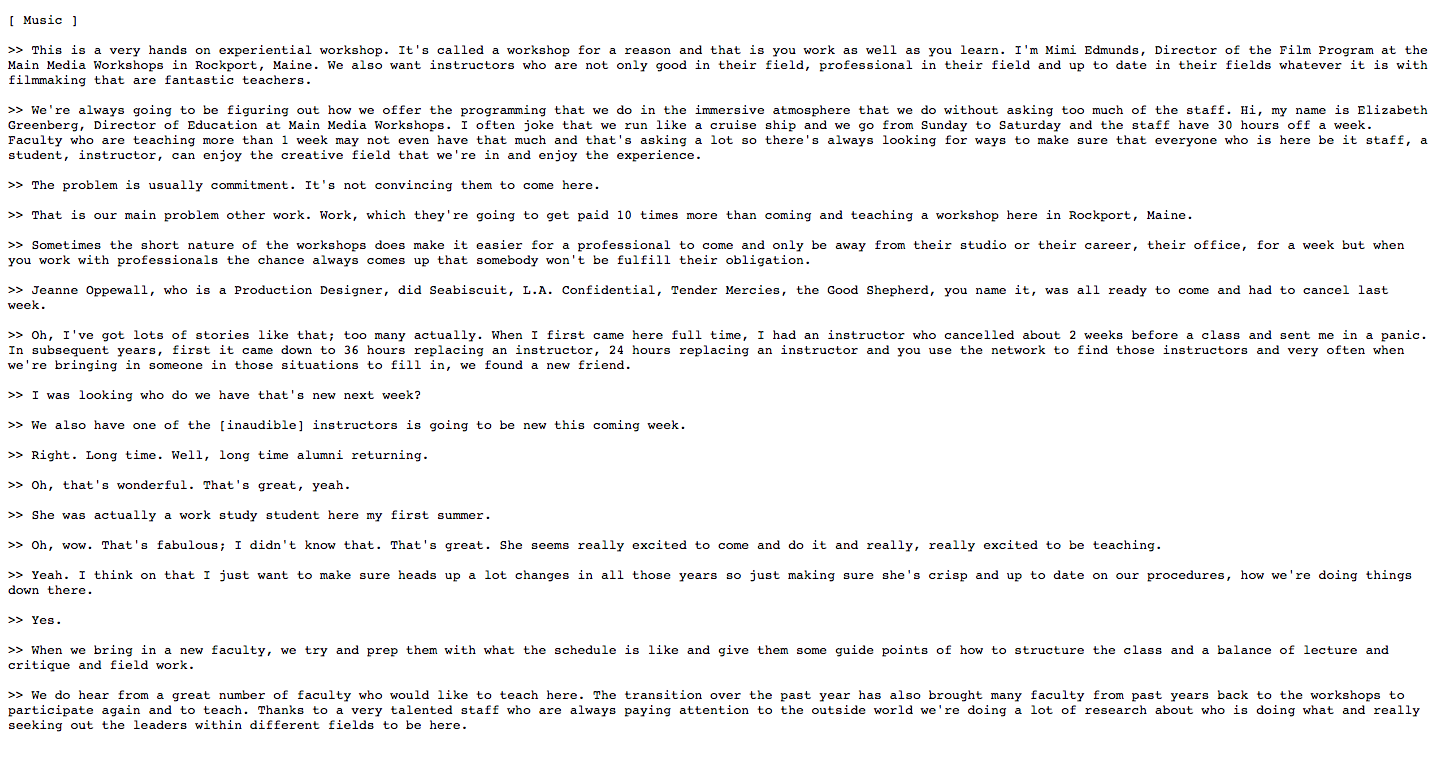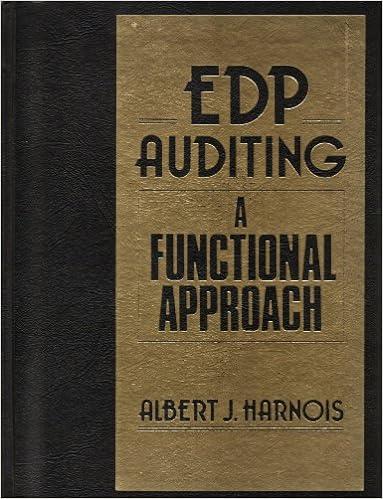



[ Music ] >> This is a very hands on experiential workshop. It's called a workshop for a reason and that is you work as well as you learn. I'm Mimi Edmunds, Director of the Film Program at the Main Media Workshops in Rockport, Maine. We also want instructors who are not only good in their field, professional in their field and up to date in their fields whatever it is with filmmaking that are fantastic teachers. >> We're always going to be figuring out how we offer the programming that we do in the immersive atmosphere that we do without asking too much of the staff. Hi, my name is Elizabeth Greenberg, Director of Education at Main Media Workshops. I often joke that we run like a cruise ship and we go from Sunday to Saturday and the staff have 30 hours off a week. Faculty who are teaching more than 1 week may not even have that much and that's asking a lot so there's always looking for ways to make sure that everyone who is here be it staff, a student, instructor, can enjoy the creative field that we're in and enjoy the experience. >> The problem is usually commitment. It's not convincing them to come here. >> That is our main problem other work. Work, which they're going to get paid 10 times more than coming and teaching a workshop here in Rockport, Maine. >> Sometimes the short nature of the workshops does make it easier for a professional to come and only be away from their studio or their career, their office, for a week but when you work with professionals the chance always comes up that somebody won't be fulfill their obligation. >> Jeanne Oppewall, who is a Production Designer, did Seabiscuit, L.A. Confidential, Tender Mercies, the Good Shepherd, you name it, was all ready to come and had to cancel last week. >> Oh, I've got lots of stories like that; too many actually. When I first came here full time, I had an instructor who cancelled about 2 weeks before a class and sent me in a panic. In subsequent years, first it came down to 36 hours replacing an instructor, 24 hours replacing an instructor and you use the network to find those instructors and very often when we're bringing in someone in those situations to fill in, we found a new friend. >> I was looking who do we have that's new next week? >> We also have one of the [inaudible] instructors is going to be new this coming week. >> Right. Long time. Well, long time alumni returning. >> Oh, that's wonderful. That's great, yeah. >> She was actually a work study student here my first summer. >> Oh, wow. That's fabulous; I didn't know that. That's great. She seems really excited to come and do it and really, really excited to be teaching. >> Yeah. I think on that I just want to make sure heads up a lot changes in all those years so just making sure she's crisp and up to date on our procedures, how we're doing things down there. >> Yes. >> When we bring in a new faculty, we try and prep them with what the schedule is like and give them some guide points of how to structure the class and a balance of lecture and critique and field work. >> We do hear from a great number of faculty who would like to teach here. The transition over the past year has also brought many faculty from past years back to the workshops to participate again and to teach. Thanks to a very talented staff who are always paying attention to the outside world we're doing a lot of research about who is doing what and really seeking out the leaders within different fields to be here. The subtitle of this video is "Building a Contingent Workforce." Why are faculty members at the Maine Media Workshop considered to be contingent workers? Check all that apply. They are temporary employees. They are full-time, permanent employees. They have other, full-time professional work. They are part-time employees. They teach people with less experience than they have. In this process, employees are evaluated by coworkers, bosses, subordinates, and themselves. The evaluations are combined to give information that can be used to make improvements. This is the art of determining how many and what types of future employees will be needed by the organization; the goal is to have the right people in the right place at the right time. [ Music ] >> This is a very hands on experiential workshop. It's called a workshop for a reason and that is you work as well as you learn. I'm Mimi Edmunds, Director of the Film Program at the Main Media Workshops in Rockport, Maine. We also want instructors who are not only good in their field, professional in their field and up to date in their fields whatever it is with filmmaking that are fantastic teachers. >> We're always going to be figuring out how we offer the programming that we do in the immersive atmosphere that we do without asking too much of the staff. Hi, my name is Elizabeth Greenberg, Director of Education at Main Media Workshops. I often joke that we run like a cruise ship and we go from Sunday to Saturday and the staff have 30 hours off a week. Faculty who are teaching more than 1 week may not even have that much and that's asking a lot so there's always looking for ways to make sure that everyone who is here be it staff, a student, instructor, can enjoy the creative field that we're in and enjoy the experience. >> The problem is usually commitment. It's not convincing them to come here. >> That is our main problem other work. Work, which they're going to get paid 10 times more than coming and teaching a workshop here in Rockport, Maine. >> Sometimes the short nature of the workshops does make it easier for a professional to come and only be away from their studio or their career, their office, for a week but when you work with professionals the chance always comes up that somebody won't be fulfill their obligation. >> Jeanne Oppewall, who is a Production Designer, did Seabiscuit, L.A. Confidential, Tender Mercies, the Good Shepherd, you name it, was all ready to come and had to cancel last week. >> Oh, I've got lots of stories like that; too many actually. When I first came here full time, I had an instructor who cancelled about 2 weeks before a class and sent me in a panic. In subsequent years, first it came down to 36 hours replacing an instructor, 24 hours replacing an instructor and you use the network to find those instructors and very often when we're bringing in someone in those situations to fill in, we found a new friend. >> I was looking who do we have that's new next week? >> We also have one of the [inaudible] instructors is going to be new this coming week. >> Right. Long time. Well, long time alumni returning. >> Oh, that's wonderful. That's great, yeah. >> She was actually a work study student here my first summer. >> Oh, wow. That's fabulous; I didn't know that. That's great. She seems really excited to come and do it and really, really excited to be teaching. >> Yeah. I think on that I just want to make sure heads up a lot changes in all those years so just making sure she's crisp and up to date on our procedures, how we're doing things down there. >> Yes. >> When we bring in a new faculty, we try and prep them with what the schedule is like and give them some guide points of how to structure the class and a balance of lecture and critique and field work. >> We do hear from a great number of faculty who would like to teach here. The transition over the past year has also brought many faculty from past years back to the workshops to participate again and to teach. Thanks to a very talented staff who are always paying attention to the outside world we're doing a lot of research about who is doing what and really seeking out the leaders within different fields to be here. The subtitle of this video is "Building a Contingent Workforce." Why are faculty members at the Maine Media Workshop considered to be contingent workers? Check all that apply. They are temporary employees. They are full-time, permanent employees. They have other, full-time professional work. They are part-time employees. They teach people with less experience than they have. In this process, employees are evaluated by coworkers, bosses, subordinates, and themselves. The evaluations are combined to give information that can be used to make improvements. This is the art of determining how many and what types of future employees will be needed by the organization; the goal is to have the right people in the right place at the right time










